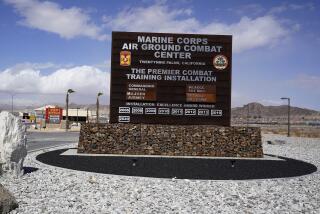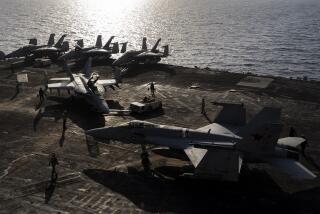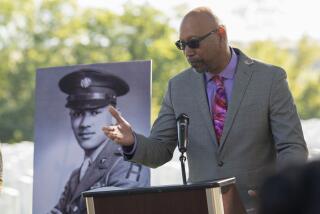Kenneth Reusser dies at 89; retired Marine colonel flew 253 combat missions in 3 wars
Retired Marine Col. Kenneth Reusser, who flew 253 combat missions in three wars and was shot down five times, died June 20 in Clackamas, Ore. He was 89.
The cause of death was not announced.
Reusser came from an era when aerial combat meant low-level bombing and also dogfighting in which enemies could see each other.
He received two Navy Cross medals, one for combat during the battle for Okinawa late in World War II and another for leading a raid over Korea in 1950 in which he flew at a low altitude to get a look inside enemy buildings.
FOR THE RECORD:
Reusser obituary: The obituary of retired Marine Col. Kenneth Reusser in Saturday’s Section A said his first combat experience was during the battle for Okinawa in 1942. The 1942 battle was at Guadalcanal. The battle for Okinawa was in 1945. Reusser fought in both. —
In Vietnam, he flew helicopters and while on a rescue mission to find downed crewmen, he was shot down, suffering burns over a third of his body. His injuries forced his medical retirement in 1968 after 27 years of service.
Retired Marine Maj. Gen. Bob Butcher, chairman of the Flying Leathernecks Historical Foundation and Aviation Museum in San Diego, said Marines who flew with Reusser regarded him as the bravest man they had ever met. “He was an incredible hero,” Butcher said.
Born Jan. 27, 1920, in the Cloverdale region of the Oregon coast, Reusser was the son of a Christian minister. He entered motorcycle racing contests to earn money for college, enlisted in the Navy Reserve in August 1941 and was soon sent to aviation training.
His first combat was during the battle for Okinawa in 1942. Later he was part of the so-called Black Sheep Squadron headed by the now legendary Gregory “Pappy” Boyington, a Medal of Honor recipient.
Like Boyington, Reusser believed in aggressively taking the fight to the enemy, regardless of rules, training procedures or personal safety.
During one mission, Reusser was assigned to attack a Japanese reconnaissance plane that was gathering intelligence on the location of U.S. forces. He followed the Japanese plane at altitudes that the U.S. plane was not made to withstand.
When his guns froze, Reusser used the propellers of his F4U-4Corsair to rip through the Japanese plane’s tail section, sending it crashing to the sea.
During the Korean War in 1950, he led missions to destroy enemy facilities in Inchon.
The citation for his Navy Cross notes: “Major Reusser led his flight in a strafing attack against a hostile factory, destroying several vehicles and 30 of the enemy in a truck despite intense and accurate hostile anti- aircraft fire.
“Suspecting that the strong defenses protected vehicles of war, he ordered his flight to orbit the target at 3,000 feet while he investigated the factory at window-level and, on his second pass, made in the face of automatic fire coming from the windows, discovered that the factory was a vehicle and tank assembly plant.”
Reusser flew back to the aircraft carrier and then returned to the site with rockets and napalm, destroying the target. He flew at such a low altitude that the explosion from an oil tanker nearly blew his own plane from the sky.
He received 59 medals during his career, and his 253 combat missions are considered the most ever by a Marine pilot.
After his retirement, he worked for Lockheed Aircraft, where he helped develop the U-2 spy plane, and then the Piasecki Helicopter Co. Retiring to his native Oregon, he was active in veterans groups.
He and his wife, Trudy, made headlines in 2004 when they defiantly refused to leave their home after it went into foreclosure. The couple had lost much of their retirement savings in a high-risk investment and then a swindle by a bookkeeper. Ultimately they were forced to obey a court order.
In addition to his wife, Reusser is survived by two sons, Richard C. and Kenneth L. Jr. Burial was at Willamette National Cemetery near Portland, Ore.
More to Read
Start your day right
Sign up for Essential California for the L.A. Times biggest news, features and recommendations in your inbox six days a week.
You may occasionally receive promotional content from the Los Angeles Times.






